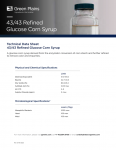Many US adults misjudge the quality of their diets, study finds

In a small study of adults seeking to lose weight, researchers found that when asked to evaluate the quality of their diet over a 12-month period, most participants overestimated the healthiness of their diet.
"We found that while people generally know that fruits and vegetables are healthy, there may be a disconnect between what researchers and health care professionals consider to be a healthy and balanced diet compared to what the public thinks is a healthy and balanced diet," said study author Jessica Cheng, Ph.D., a postdoctoral research fellow in epidemiology at the Harvard T. H. Chan School of Public Health and in general internal medicine at Massachusetts General Hospital.
Similar findings from the USDA's Agricultural Research Service came out earlier this year that found most (99% of those surveyed) overestimated the quality of their diets.
The findings -- presented at the American Heart Association’s Scientific Sessions 2022 -- are considered preliminary until published as a full manuscript in a peer-reviewed scientific journal. The study was funded by the National Heart, Lung, and Blood Institute, a division of the National Institutes of Health.
Dietary disconnect
Researchers evaluated the diets of 116 adults aged 35-58 years old who were trying to lose weight. Study participants met one-on-one with a dietitian to discuss their nutrition and then tracked everything they ate and drank every day for one year on the Fitbit app. They also weighed themselves daily and wore a Fitbit device to track their physical activity.
Researchers calculated a Healthy Eating Index (HEI) score (0-100 point scale) at the beginning and end of the study based on the types of foods that participants reported eating. The HEI is a measure for assessing how closely a dietary pattern aligns with the U.S. government's Dietary Guidelines for Americans and is based on the frequency of eating various dietary components such as fruits, vegetables, whole and refined grains, meat and seafood, sodium, fat, and sugar.
Participants were also asked to rate their diets at the beginning and end of the study by completing a 24-hour food recall for two days at each time point. The difference in their starting and ending scores was their perceived diet change.
When comparing researchers' HEI scores and participants' self-reported scores, about 1 in 4 participants' scores had good agreement between their perceived diet score and the researcher-assessed score.
The remaining 3 out of 4 participants' scores had poor agreement with researchers' assessment with most reporting a perceived score that was higher than the HEI score assigned by researchers. The average perceived score was 67.6 and the average HEI score was 56.4.
At the end of the study, participants improved their diet quality by about one point based on the researcher-assessed score. However, participants' self-estimate was a perceived 18-point improvement.
While common to overestimate your own eating habits, this mindset can easily lead to further health frustrations among adults trying to follow a healthy diet.
"Overestimating the perceived healthiness of food intake could lead to weight gain, frustrations over not meeting personal weight loss goals or lower likelihood of adopting healthier eating habits," commented study author Deepika Laddu, Ph.D., an assistant professor in the College of Applied Health Sciences at the University of Illinois, Chicago, and chair of the American Heart Association's Council on Lifestyle Behavioral Change for Improving Health Factors.
"While misperception of diet intake is common among dieters, these findings provide additional support for behavioral counseling interventions that include more frequent contacts with health care professionals, such as dieticians or health coaches, to address the gaps in perception and support long-lasting, realistic healthy eating behaviors."
Study limitations
Among the study's limitations are that participants were mostly female (79%) and the majority reported white race (84%), so the findings may not apply in the same ways to other populations. In addition, the researchers assessed diet quality perceptions only at the end of the study.
"People attempting to lose weight or health professionals who are helping people with weight loss or nutrition-related goals should be aware that there is likely more room for improvement in the diet than may be expected," said Cheng. She suggests providing concrete information on what areas of their diet can be improved and how to go about making healthy, sustainable nutrition changes.
"Future studies should examine the effects of helping people close the gap between their perceptions and objective diet quality measurements."

















